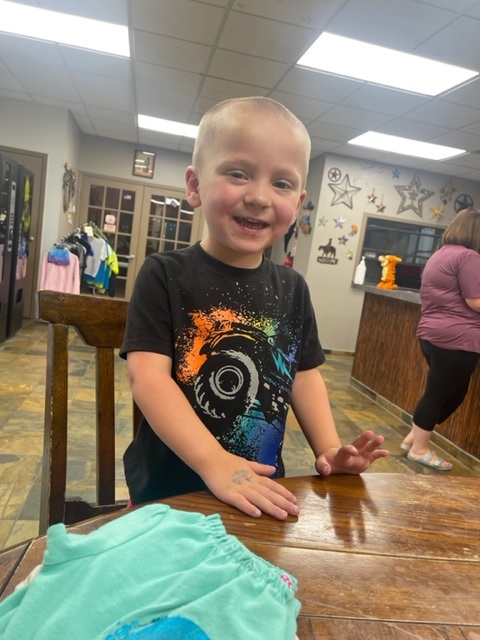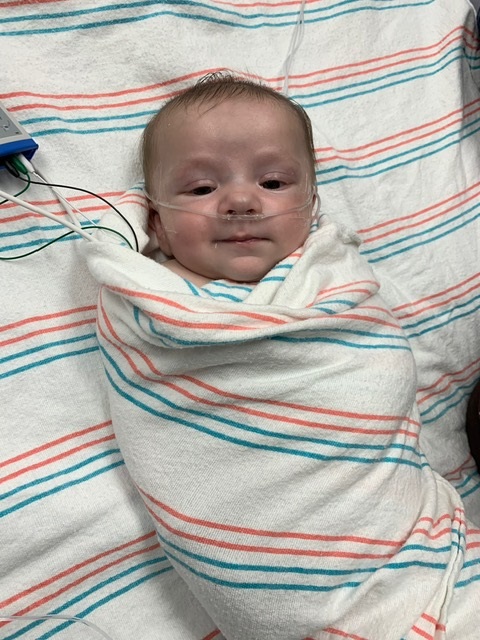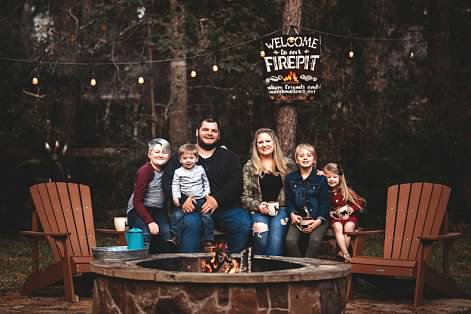Ryder is a happy 3-year-old who lights up a room with his big radiant smile. As the youngest of four children, he loves playing games with his older brother and two sisters. He has mastered the art of tumbling around on the floor so much so that his parents enrolled him in gymnastics.
 “Ryder is always smiling, and that’s the first thing people notice about him,” said Falon Lindner, Ryder’s mom. “Now that he is 3, his personality is beginning to shine through. He is very independent and wants to do things on his own, and he is also starting to get a little opinionated, too. When my husband, Josh, and I see him today, we can’t help but think of the many obstacles our little boy faced and overcame courageously in his young life. It’s hard to tell that Ryder is a heart baby.”
“Ryder is always smiling, and that’s the first thing people notice about him,” said Falon Lindner, Ryder’s mom. “Now that he is 3, his personality is beginning to shine through. He is very independent and wants to do things on his own, and he is also starting to get a little opinionated, too. When my husband, Josh, and I see him today, we can’t help but think of the many obstacles our little boy faced and overcame courageously in his young life. It’s hard to tell that Ryder is a heart baby.”
When Falon was 23 weeks pregnant, she was very excited about her next ultrasound and couldn’t wait to catch a glimpse of Ryder on the ultrasound screen to see how much he had grown since his last anatomy scan. At first, things were going well. Then, the atmosphere in the room abruptly changed.
“When my OB/GYN, Dr. Pamela Berens, walked in, I could see a concerned look on her face,” said Falon. Dr. Berens is a professor in the Department of Obstetrics, Gynecology and Reproductive Sciences at McGovern Medical School at UTHealth Houston and affiliated with Children’s Memorial Hermann Hospital. “She told us our baby had a heart problem. She thought Ryder might have aortic stenosis, but she said a fetal echocardiogram would confirm that for sure. As you can imagine, my husband and I were overwhelmed. It took a while for us to process everything. This was supposed to be an exciting moment for our family. Since Ryder needed a fetal echo, we were immediately referred to The Fetal Center at Children’s Memorial Hermann Hospital in the Texas Medical Center.”
The Fetal Center at Children’s Memorial Hermann Hospital is a national referral center and an international leader in fetal diagnosis, fetal intervention and comprehensive fetal care for infants with congenital and genetic abnormalities. In collaboration with pediatric subspecialists at McGovern Medical School at UTHealth Houston, the affiliated team partners with the Children’s Heart Institute to offer patients with congenital heart defects a complete range of prenatal testing for both mother and baby before, during and after birth.
 “We receive numerous patient referrals to The Fetal Center because of our team’s specialized expertise in complex fetal cardiac conditions,” said Dr. Vidhya Annavajjhala, assistant professor of pediatric cardiology at McGovern Medical School, and an affiliated pediatric cardiologist and fetal echocardiologist with the Fetal Heart Program at Children’s Memorial Hermann Hospital. “Congenital heart defects are the most common type of birth defect, affecting about 1 in every 100 babies born in the U.S. We use the most advanced imaging and monitoring tools to detect fetal heart anomalies as early as the second trimester to ensure we identify the appropriate treatment plan for mother and baby.”
“We receive numerous patient referrals to The Fetal Center because of our team’s specialized expertise in complex fetal cardiac conditions,” said Dr. Vidhya Annavajjhala, assistant professor of pediatric cardiology at McGovern Medical School, and an affiliated pediatric cardiologist and fetal echocardiologist with the Fetal Heart Program at Children’s Memorial Hermann Hospital. “Congenital heart defects are the most common type of birth defect, affecting about 1 in every 100 babies born in the U.S. We use the most advanced imaging and monitoring tools to detect fetal heart anomalies as early as the second trimester to ensure we identify the appropriate treatment plan for mother and baby.”
On July 6, 2018, Ryder’s fetal echocardiogram confirmed that he had hypoplastic left heart syndrome (HLHS), a severe congenital heart condition in which the left side of the heart is underdeveloped and cannot pump oxygen-rich blood to the body. The affiliated pediatric cardiology and cardiovascular surgery team met with the Lindners to explain Ryder's heart condition and map out what their surgical care plan would be after Ryder was born.
“An important part of the process for our patients with complex cardiac needs is to have the parents meet with our multidisciplinary team that consists of maternal fetal medicine specialists, genetics, neonatologists and a dedicated cardiac nurse coordinator to create a coordinated delivery and postnatal plan for the patient,” adds Dr. Annavajjhala. “This really gives our patients comfort and their families peace of mind as they walk through what can be an overwhelming process.”
“Ryder’s doctors were a huge support to me and my wife especially during a time when we needed it the most,” said Josh. “We knew that HLHS was a life-threatening condition, but Dr. Annavajjhala and and his team helped put our minds at ease as far as what to expect. If we had questions – and we had a lot of them – they always answered our questions. After our initial consult with them, we knew Ryder would be in good hands and that meant the world to us.”
Falon saw Dr. Annavajjhala every six weeks at The Fetal Center to check on Ryder’s heart, along with ultrasound visits with her OB/GYN to make sure her baby was growing and developing at a normal pace. Then, on Oct. 14, 2018 – three weeks before his actual due date – Falon and Josh welcomed Ryder, weighing 6 pounds and 1 ounce, at Children’s Memorial Hermann Hospital. Falon spent a brief moment with her son before he was transferred to the hospital’s Level IV NICU. The Lindners knew that Ryder’s birth would mark the start of a long journey ahead.
On Oct. 19, 5-day-old Ryder underwent his first open-heart procedure. The Norwood procedure, which is the first of three surgeries to correct his condition.
Ryder's heart was rerouted so the right ventricle can take over both jobs of pumping blood to the lungs and to the body. “Babies born with HLHS need the Norwood procedure because their left ventricle and aorta are too small to pump blood to the rest of the body. This procedure is considered the most complicated of the three single-ventricle treatment surgeries to palliate HLHS.”
“Although Ryder’s surgery went well, it was tough to see him hooked up to many chest tubes and IVs, and hearing the constant beeping noises from the equipment,” said Josh. “As Ryder got stronger week by week, his nurses gradually weaned him off of some of his medications. Every medicine and every tube that he came off of was like a small graduation. After spending six weeks in the hospital, we took Ryder home just in time for Thanksgiving. We spent a few more months with him at home before Ryder was ready for his second open-heart surgery.”
On Feb. 27, 2019, when Ryder was 4 months old, he underwent the Glenn procedure to reroute blood flow from the upper body to his lungs. As a result, some of the blood goes directly to the lungs without circulating through the heart. After his second surgery, Ryder spent a week in the hospital before he was ready to head back home.
 Ryder was closely monitored at home to identify any “red flags” such as abnormal parameters or changes in condition address them timely.
Ryder was closely monitored at home to identify any “red flags” such as abnormal parameters or changes in condition address them timely.
“Our son has come a long way,” said Falon. “We are thankful to the care team from the doctors and nurses in The Fetal Center to our cardiology and surgery teams for taking great care of Ryder. They were a huge blessing to our family. To this day, Ryder gets excited when he sees Dr. Annavajjhala for his follow-up appointments. She’s been with Ryder for the last three years. They are all part of our family.”
As hard as it is to think about their son having to go for his third open-heart surgery sometime in the fall of 2022 – the last surgery (Fontan procedure) to correct HLHS – the Lindners are comfortable with the process and team.
“We have faith in our team at Children’s Memorial Hermann,” added the Lindners. "You have to trust your team because they know what they are doing. It’s scary when you rely on the internet versus the staff that’s been through it or seen it. Working with Ryder’s physicians gave us hope and confidence that everything would be okay. This has been a tough journey, but our family has gotten stronger because of it. As emotional as it was for us, it was emotional for our friends and family as well. They’ve been part of this journey and they love Ryder. We love our son too.”
Learn more about the Fetal Heart Program at Children’s Memorial Hermann »
Contact Us
To contact Children’s Heart Institute at Children’s Memorial Hermann Hospital, please fill out the form below.
If you are experiencing a medical emergency, call 911 or go to the nearest emergency room.
If you or someone you know needs support from the Suicide and Crisis Lifeline, call or text 988.
The Children’s Heart Institute is a collaboration between the affiliated physicians at McGovern Medical School at UTHealth Houston and Children’s Memorial Hermann Hospital. Typically, patients are seen on an outpatient basis at a UT Physicians clinic with all inpatient procedures performed at Children’s Memorial Hermann Hospital.